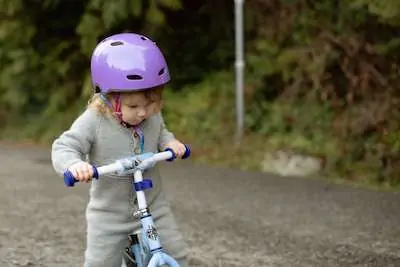Have you ever heard that babying children is a bad thing? Maybe your grandmother told you to stop coddling your child. It’s true; coddling a child leads to problems later in life, and you need to avoid that.
Coddling is not cuddling or loving your child; it means that you’re too protective and prevents anything bad from happening to your child. Parents solve all of their child’s problems and get them everything they want.
Does this sound like you?
If so, take a look at what coddling means and why it leads to problems later in life. You might be surprised that this causes some serious issues throughout adulthood.
What Does Coddling a Child Mean?
As parents, we want to nurture and protect our children, helping them grow into independent, productive, kind human beings. Parents must find a balance between providing enough supervision that keeps their children safe without over-supervising and not allowing their children to fail.

When you had a newborn baby, the desire to protect your child from harm is intense, but as your baby starts to grow, it’s easy to worry too much about the problems and disappointment that our children face. That obsession leads to being an overprotective parent who tries to stop her child from experiencing disappointment.
For example, part of playing sports is learning about failure. If you never allow your child to fail and struggle to understand a new concept, they’ll struggle to do so as an adult.
Indulging a child typically results from parents giving their child everything they need because they didn’t receive it as a child. Instead of allowing a child to work out a problem, coddling parents step in and solve the problems themselves. They intervene unnecessarily and provide instant gratification for things that their child wants.
How Do You Know If You Are Babying Your Child?
It’s hard to tell when you take your parenting too far. Parents know that enforcing crazy, excessive rules is a problem, but coddling is a bit more subjective.
Here are 5 vital signs to remember to know if you’re babying your child.
You Intervene Too Quickly
Coddling parents step in when there is a problem way too quickly; they want to shield their child from discomfort.
At first, this seems like the right thing to do as a parent. It’s our job to make sure our kids are okay, but if your child never learns to solve problems on their own as a child, they’ll never do so as an adult.
Let your child solve problems; offer help when they ask for it. Kids are intelligent and full of ingenuity to face problems.
You Do Everything for Your Child
Children need to have tasks and chores. They should clean their rooms, have to wait when it’s not their turn, and learn patience. You cannot drop everything at once to grant your child’s wishes.
Doing everything for your child deprives your child of the opportunity to learn responsibility and independence.
You Micromanage Activities and Friendships
Do you want to control everything your child does and who they spend time with? This is part of coddling. If you find that you have strong opinions about your children’s sports, who should be their friends, and where they spend time with those friends, you might be a coddling parent.
Kids have to learn how to make mistakes. Sometimes, that means they have to get their feelings hurt because they were friends with the wrong kids. It means they have to play a sport that they don’t like to learn it’s not for them.
Mistakes are okay; let go of the leash and let your child make mistakes.
You Go Overboard Protecting and Consoling Them
No parent wants their child to get hurt, and it breaks your heart to see your child hurt or upset. However, overprotecting your child leads to fears of potential dangers.
Getting hurt is part of life. Every child trips or falls off of their bicycle. Teach your child that getting hurt is part of life, and encourage your child to bounce back.
You Discourage Them From Trying Things That Make You Uncomfortable
It’s okay to feel nervous for your child when they decide to try something new, but don’t discourage your child because it makes you nervous. If your child decides that they want to try baseball, don’t tell them all of the negative things that might happen. Encourage them to give it a try, even if it makes your heart beat faster.
What Are The Long-Term Effects of Coddling?
For parents, coddling makes you feel like a good parent. You solved a problem for your child; your child is healthy, happy, and loving life. That makes you feel good.
But you aren’t thinking about the long-term effects that babying children causes.
The most significant and most detrimental effect of babying children is that it makes it difficult for that child to become a successful adult.
You might be thinking that feels insane. How can loving and protecting your child too much make it hard for them to become a successful adult?

Coddling causes adults to:
- Give up too soon on things that might be hard and challenging at first.
- Struggle to fight their own battles because they were deprived of that opportunity as a child.
- Expect high levels of instant gratification that are unrealistic as an adult.
- Expect high levels of stimulation
- Low levels of motivation
- Expect always to get what they want
- Never learn how to have resilience when struggling and encountering challenging situations in life.
When your child never has to struggle or learn to face challenging situations head-on, they won’t be able to do so as an adult. We learn how to face challenges as a child, but if the situations are always solved for us and quickly, it’s impossible to learn how to handle that when it comes your way in the future.
How to Stop Babying Your Child?
It’s time to stop babying your child, but how do you do that? Sometimes, it’s easier to coddle and be overprotective than it is to let go.
Here are some tips to get you started.
Give Your Child Daily Chores
Giving your child responsibilities is a vital part of letting your child grow up. Adult life involves many responsibilities, and you start to teach your child that life requires work from a young age.
Make sure your child has daily, age-appropriate chores to accomplish each day. A child as young as three years old can start to help around the house, typically assisting a parent. A five-year-old child can pick up toys, feed the dogs, and work on other small tasks.
Give Your Child Independence
The media makes us afraid to let our kids be independent; abduction stories are splashed in our faces all of the time. They don’t tell parents that statistics show that stranger abductions have decreased in the last few decades, but the media showcases each one, making it seem like the number is growing.

Let your child ride his bike around the neighborhood without you. Let your child walk home from his friend’s house.
It’s scary, but giving your child independence is essential. Take small steps and teach your child how to stay out of trouble and away from strangers.
Don’t Always Take Their Side
Your child won’t always be in the right. They might have a bad day but take it out on everyone around them. Kids start fights and cause problems with other kids.
Don’t take your child’s side automatically. It’s natural always to think the best of your child, but don’t immediately believe that the other party is at fault.
This often happens at school. If your child’s teacher tells you that there is a problem, listen to the insight and realize that your child might need to work on an issue that they have. That’s okay; it’s part of getting older.
Let Your Child Solve Problems
When a challenging situation arises for your child, push down the urge to fix the problem. Your child has to learn how to face difficult situations independently without the assistance of their parents.
This is important:
Wait for your child to ask for help. Unless they ask, assume that your child is figuring the problem out on their own. Kids will tell their parents that they need help; watch and observe from the sidelines.
Don’t Give Them All of Their Wishes
A significant problem that kids have is that their parents give them everything they want and wish. Teaching our kids the difference between wants and needs is a huge deal.
Needs are more crucial than wants, and sometimes, you don’t get everything you want. Other times, you’ll get what you want but need to wait for it.
Instant gratification is a huge problem for adults and kids alike. When we want something, we want to get it immediately, but that’s not always practical.
Coddling is Not Good
Sometimes, parents confuse coddling with cuddling; it’s not the same thing. Babying children leads to problems later in life. You can never love your child too much, but you can be too overprotective and indulge too much, leading to struggles as an adult later. That’s what you need to avoid.
Hey, this is Linda. My biggest accomplishment in life is being a mother of four children. Their current ages range from almost ten years old down to 20 months old.
I’m passionate about writing parenting articles because I understand so well all of the problems and trials you face as a parent. From breastfeeding woes to budgeting problems and behavior problems, along with everything in between, chances are I’ve faced it over the last ten years. Read more about Linda here.
